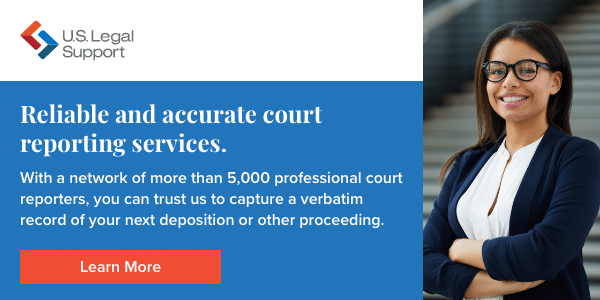

Court reporters hold the great responsibility in civil and criminal justice of capturing testimonies and legal proceedings at the local level all the way up to the United States Supreme Court. While the importance and atmosphere might seem intimidating, court reporting is a desirable career opportunity, with easily accessible education, competitive salary, and flexible work schedules.
In fact, the U.S. Bureau of Labor Statistics (BLS) reports the job outlook to increase by around 3% over the next year, keeping court reporting professionals in high demand.
With that in mind—let’s explore the steps to becoming a court reporter.
Court reporting doesn’t require decades of academic education or years of apprenticeship, but it is a profession that requires various education and licensing in each state—which means your first step is to investigate your state board’s requirements.
Note: In this article, we cover the basics but focus particularly on how to become a court reporter in California.
There are multiple routes to becoming a court reporter, but they all start with a minimum education of a high school diploma or GED.
Further education is available via court reporting programs at community colleges and technical institutes, typically leading to a two-year associate’s degree or certificate. These programs help students work toward obtaining fast typing speeds and accuracy, as well as covering:
In California, there are only eight stenography schools with programs recognized by the licensing board. 2 You can also opt to pursue one of three specific professional certification tracks, or simply obtain provable on-the-job experience rather than attending a degree or certificate program.
Most states allow you to skip a degree program in favor of direct job experience or certification from a recognized professional association. Check with your state board to see what education, certificates, or experience is required for licensure.
If you’re considering a career as an official court reporter, you’ll need to bring more to the table than a high WPM (words per minute) count. Top-notch court reporters have:
At a technical level, court reporters need:
There are four primary organizations that offer accreditation to confirm professional court reporting expertise, based on the type of court reporting. You can learn directly from each how to become a certified court reporter under their programs:

Court reporters are licensed at a state level. While requirements vary from state to state, they typically include:
To prove professional skills and knowledge, licensing boards often require satisfactory completion of an exam, professional certification, or both.
In the Golden State, the Court Reporters Board of California is the gatekeeper for licensing Certified Shorthand Reporters (CSRs). 7 In addition to the age, basic education, and criminal background check noted above, applicants must qualify to take an exam by providing one of the following 8 :
Once qualified, licensure applicants will take a three-part exam consisting of:
Finally, after successful exam completion, a potential CSR submits an application and fee to the California Court Reporters Board to receive their license to practice.
Court reporters typically specialize in one of three methods to capture verbatim testimony, each with their own unique equipment.
While your day-to-day work life may not be quite as dramatic as a Law & Order episode, court reporting does provide variety, interest, and meaningful participation in civil and criminal cases that affect lives and legal precedent.
Additionally, you’ll benefit from a profession in court reporting through:
If you’re ready to commit to a court reporting career, U.S. Legal Support can help. We offer:
Ready to learn more? Find out about these legal support services and ask general questions about court reporting careers by emailing [email protected] .
Sources:

Julie Feller is the Vice President of Marketing at U.S. Legal Support where she leads innovative marketing initiatives. With a proven track record in the legal industry, Juie previously served at Abacus Data Systems (now Caret Legal) where she played a pivotal role in providing cutting-edge technology platforms and services to legal professionals nationwide.
![]()
Content published on the U.S. Legal Support blog is reviewed by professionals in the legal and litigation support services field to help ensure accurate information. The information provided in this blog is for informational purposes only and should not be construed as legal advice for attorneys or clients.